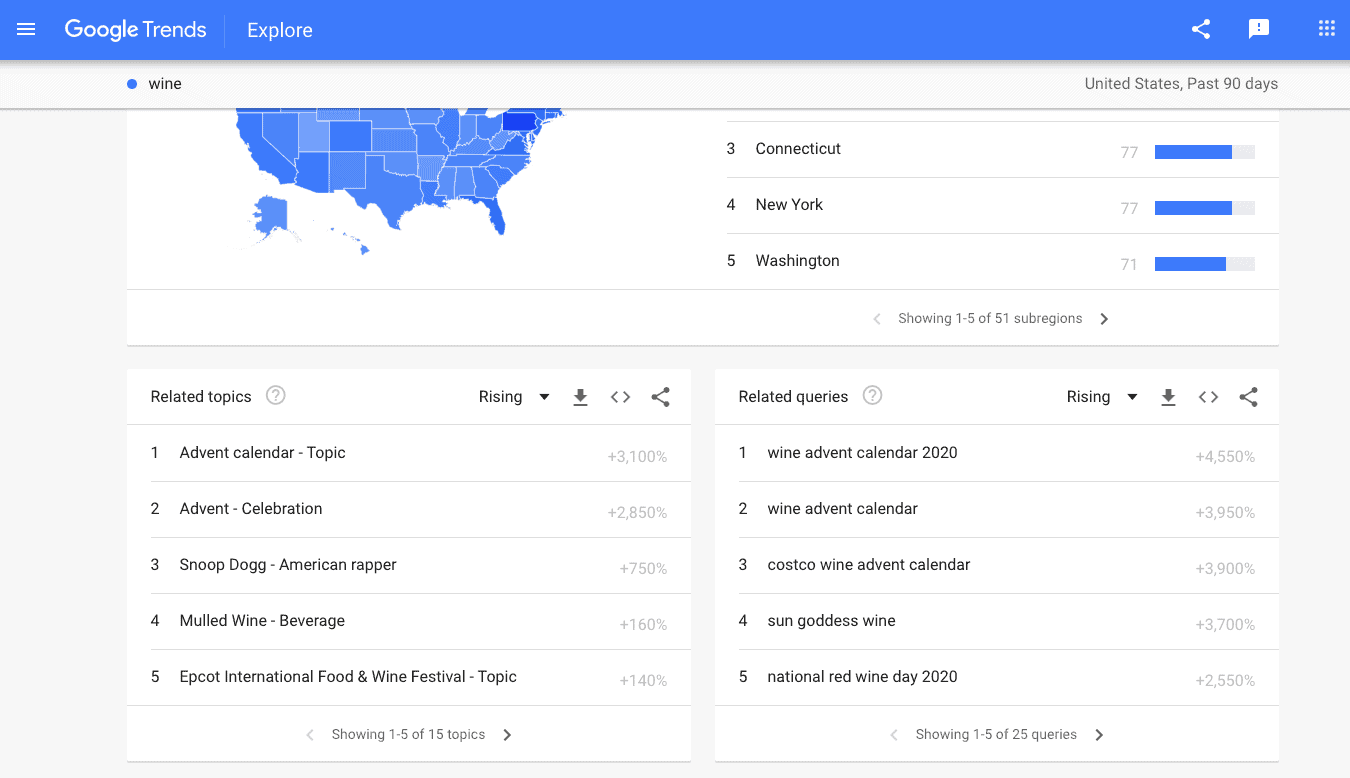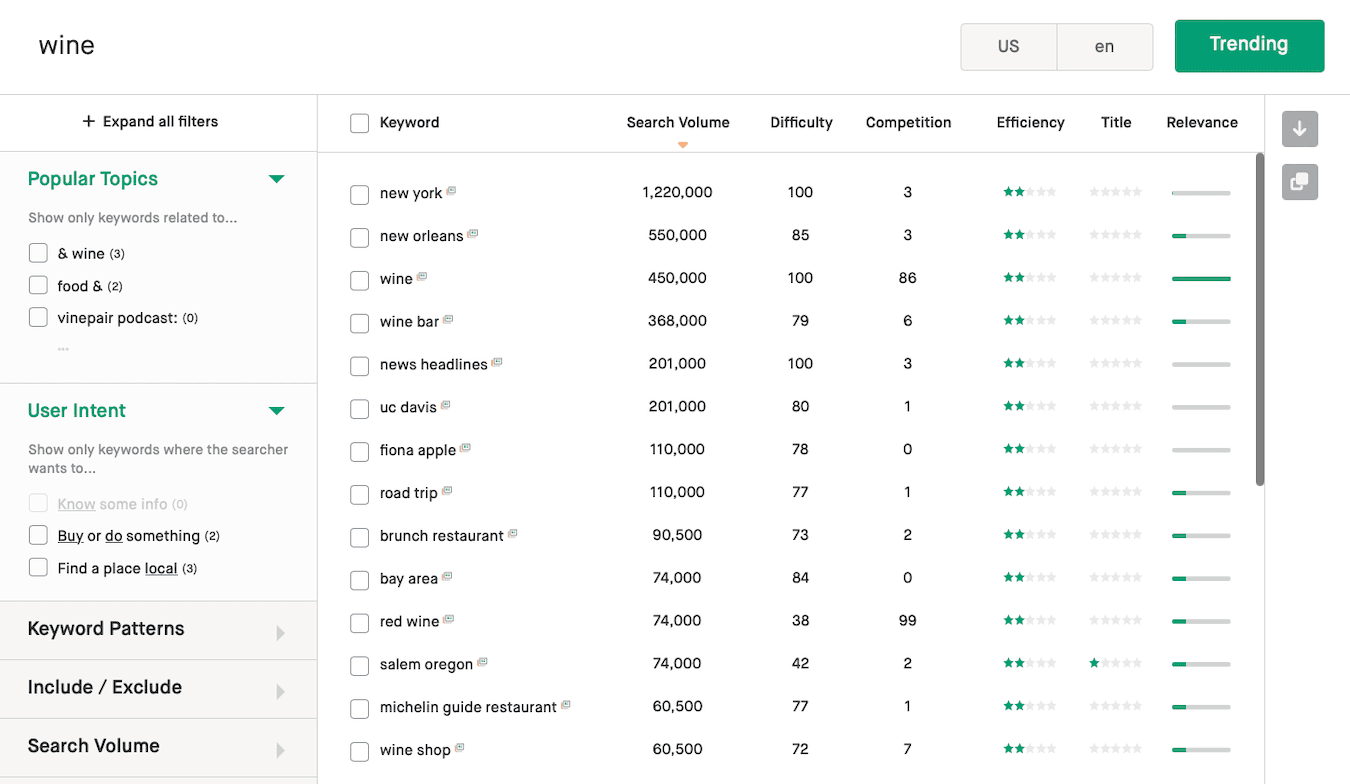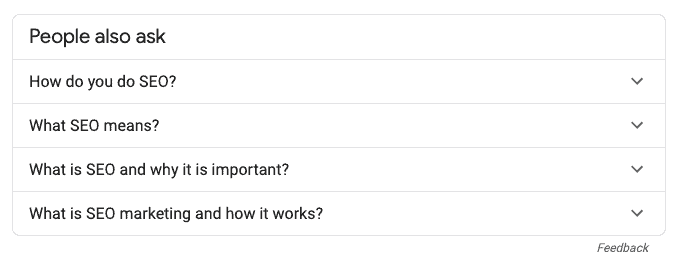Keyword research is different today than it was even a few years ago. Search engines often change their algorithms to prevent people from keyword stuffing without adding any real value to the topic. However, the words you use and how you organize your articles still indicate what users might expect by visiting your site. Keywords still matter.
Keywords are how search engines figure out what topic your content covers and if it is relevant to what the consumer seeks. When you understand how to use keywords effectively, you drive new visitors to your site via search engines.
Here are some tips for researching the best phrases to use in your online content.

How Do I Find The Right Keywords?
1. Find Common Searches
Your first step to utilizing the power of keywords is figuring out which phrases match your industry. There are some simple ways to find common search terms.
Start by typing in a word or two related to your industry and then looking at what pulls up in Google Trends. The results tell you which keywords are popular now. You can also look at trending topics on social media.

Using Google Trends to find out keyword ideas related to the search term “wine”.
Another way is to use Twinword Ideas. It will provide you a list of trending keywords from Google News, which is related to your query. By utilizing this feature, you will be able to gain insights on the trends related to the specific keyword which could help you write a trend-sensitive, SEO-friendly content. You might want to click a keyword to read a news article on why this keyword is trending and related to your query.

Using Twinword Ideas to find out keyword ideas related to the search term “wine”.
2. Study Competitors
Study your competitors and the keywords for which they rank. Once you figure out a keyword that you want to utilize, study the content of other players in your industry.
What can you cover that they don’t? How can you make your articles better than theirs?
3. Aim For Long-Tail Keywords
What Are Long-Tail Keywords?
Long-tail keywords are more specific search terms and match the way the majority of people utilize search engines. They are particularly important for voice-friendly searches, as people tend to ask a question rather than type a single keyword or two.
An example of long-term keywords might be “best apple crumble recipes” versus “apple recipes.” Think of long-tail as a more specific hunt for a topic.
Why Are Long-Tail Keywords Important?
Marketing guru Neil Patel suggests using highly specific search phrases or long-tail keywords because about 70% of all web searches focus on long-tail keywords. Think about how people use browsers. They tend to type questions or specific commands, such as, “Where can I find hand-churned butter pecan ice cream in Chicago?”
Long-tail keywords are more effective because they narrow down the base of searchers. When the person lands on your page, they’re further into the sales funnel and more likely to complete a purchase.
4. Avoid Keyword Cannibalization
What Is Keyword Cannibalization?
Keyword cannibalization refers to various blog posts or articles on the website that are targeting the same keywords, and therefore, competing for the same search query on Google SERP.
You may write on similar topics quite frequently and even use the same keywords without realizing it. You basically compete with yourself and wind up knocking the rank of all related pages down.
It’s much better to come up with alternative phrases people might type into the search engine bar.
How To Avoid Keyword Cannibalization?
Avoid redundancy by using a thesaurus and conducting research on related but unique phrasing through tools such as Word Hippo.
With this tool, you can search for synonyms or go in the opposite direction and look for antonyms. You can sometimes switch up your phrasing by writing from the other side of a topic.
Do a deep dive into the meaning of different words and see if a different topic matches your goals better.
Or you can also check out Google’s People Also Ask section to find out the related ideas targeting different keywords.

An example of Google’s People Also Ask
5. Avoid Keyword Stuffing
What Is Keyword Stuffing?
Throughout the 1990s, keyword stuffing drove traffic to websites. Some unscrupulous bloggers used the way Google’s algorithms worked to use the same phrase over and over, whether it made sense in the actual reading of the text or not. They also tried tricks such as making the text the same color as the background, so search engines picked it up but users didn’t see it.
Over time, Google’s algorithms improved. They sought to send users to helpful content rather than just matching a set of words. As computer natural language patterns became more advanced, search engines wised up and began looking for unique and exciting content. Google even hired people to rank thousands of websites based on whether they felt the topic matched the keyword and added value.
How To Avoid Keyword Stuffing?
Some keywords are hard to avoid because you naturally use the same wording within your detailed descriptions on the topic. While you do want to use some keywords, you don’t want to stuff them in for the sake of using them. Here are some ways to avoid keyword stuffing:
- Read your work out loud. If you use a keyword and it doesn’t make sense in the sentence, get rid of it.
- Use a thesaurus to come up with different ways of saying similar things.
- Run your work through a grammar checker like Grammarly. Some tools will tell you if you’re overusing a phrase too often by checking for redundancy.
There isn’t a set number of times to use a keyword or phrase in your content. You have to determine if the length of the content warrants when and where you’re using it, and whether there is a different way you can say the same thing. The value of your content is far more crucial to search engine results.
6. Understand User Intent
It’s vital that you understand who your audience is and what they want. Your first task should be creating buyer personas to match your typical customers. Once you know the demographics and psychographics of those who buy from you, you can better develop interesting and helpful content. You might even be able to put yourself in their shoes and figure out the types of phrases they use when searching for an answer online.
Some content so perfectly matches user intent that it stands out from the pack. Common sense helps you figure out user intent and sync your articles to it. Here are some examples of how content might mesh with user intent:
- The user searches for, “How Deep Is the Grand Canyon?” The content answers the question in the first paragraph and then explains how the canyon formed and other details of interest.
- Someone asks Google, “How Can I Become a Teacher?” Your website offers an article explaining the process based on the state the person lives in, how much education they need, and licensing requirements.
- Another browser types in, “Trick-or-Treating in My Area.” They live near you, and you’ve written an article listing all the locations for door-to-door and trunk-or-treat-type activities in a 30-mile radius. You include times, dates, what activities the organization plans for the day, and the addresses for the events.
Don’t try to rank for a keyword if you aren’t going to answer the user’s question. If your post doesn’t match the user’s intent, you aren’t likely to rank well for the phrase. Within your post, you should also answer some of the People Also Ask options, if there are any. Read more on how to create a user intent SEO strategy.
Which Keywords Are Worth Your Time?
Some keywords pay more per click than others. Start by searching for the keyword you’re interested in using.
Look at how much the phrase compensates on average (CPC). Next, look at the competition. Are you going to be competing with a lot of people to rank for that phrase? Ideally, you want a keyword with a high CPC and low competition.
Also, be aware of the search volume. If there are 50,000 searches each month for the keyword, you’re going to get more traffic than if there are 10 searches each month.
When deciding if your site will rank for a keyword, take the time to look at the top two or three sites already ranking. Are the posts older ones that are a bit stale? Look at position zero and see if you can write something more stellar. Is there more current information? Did they leave anything out that you can add to the conversation? Are you competing with mega-sites with a lot of advertising money to throw at the keyword?
You can learn a lot by studying the first page of Google results. If there are ads at the top of the results, people pay money to rank for the phrase. If there are giant names just under the ads, you’re competing with full marketing departments and massive promotional budgets. Be smart about the projects you take on, and you’ll have a better chance of ranking well.
Why You Should Focus on Keyword Research
Keywords help you understand the intent of the user and where your focus should be.
Researching what information users want can also help you come up with new topic ideas.
With a little digging, you’ll soon come up with topics you hadn’t considered before. Driving traffic to your site is a combination of marketing, providing valuable content, and making smart keyword choices.
Other In-depth Keyword Research Related Posts You Might Be Interested in:
- How To Put Keywords In Your Blog Posts For SEO
- What Is Keyword Difficulty Or Organic Competition And How To Understand It
- Where Do Keyword Research Tools Get Google Search Data and Statistics
- Using Keyword Patterns To Get The Customers Who Are Ready To Buy




1 Comment
We can do the better practise through the website its very much useful for beginers.can Get much information about the keyword